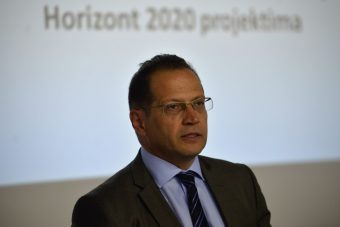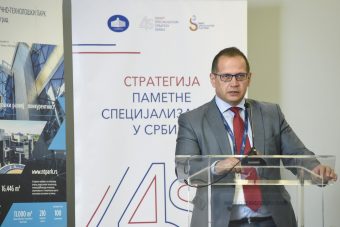
What are the strategically important scientific projects supported and financed by the state with the view to preserve the environment, how are the scientific community and the economy connected, how are our scientists ranked in the world and how much do we share our experience in this field with others, are we in line with EU laws and standards when it comes to the development of science and technology and what EU funds do we use for these purposes, we spoke with Prof. Viktor Nedovic PhD, Assistant Minister in charge of International Cooperation and EU Integration at the Ministry of Education, Science and Technological Development.
EP: To what extent is the Ministry of Education, Science and Technological Development strategically committed to developing indigenous scientific potential towards improving living conditions and environmental protection?
Viktor Nedovic: The Ministry finances numerous research projects through four different programs. For example, through integrated and interdisciplinary research program, in Serbia are implemented projects such as the research of agrobiodiversity and land m muse, monitoring and assessment of long-term exposure to environmental pollutants, development of a global system for continuous research and integrated ecosystem management, bioremediation and soil degradation research, research in climate change and their impact on the environment…
The things that are being developed are methods, sensors, and systems for monitoring water, air and soil quality, technologies for monitoring and protecting the environment from harmful chemical substances and radiation load, as well as research into the effects of ionizing and UV radiation in the field of medicine and environmental protection and monitoring of electromagnetic radiation of mobile telecommunication systems in the environment. Through the technological development program, projects are being implemented to study the impact of mining waste on water pollution, develop new bioecological materials for soil and water protection, improve sediment remediation technology for water protection, develop bio-sorbents for natural and wastewater treatment, develop methodologies and tools to protect the noise of urban areas, develop hydro information systems for monitoring and early warning of droughts, as well as projects for the reduction of air pollution from thermal power plants and systems for the removal of harmful components of smoke and the development of technologies for building non-pollution thermal and other power plants.

EP: The Ministry, through the Innovation Fund, implements programs that finance the development of innovation, with a particular focus on start-ups or mature companies. What is your experience with environmental innovation so far?
Viktor Nedovic: The Fund also encourages the cooperation of private companies and research organisations to jointly, with concerted efforts develop new, innovative products, services or technologies. As far as environmental projects are concerned, several projects have been supported so far. For example, one of them has developed a software application that offers an efficient system of environmental impact assessment or the development of a graphene acoustic camera for use on drones to record noise sources. Another example is a company that has developed a mushroom growing technology that is based on industrial-scale waste utilisation and energy minimisation. The fund also provided financial assistance through the Strawberry Energy Early Development Program, a start-up that is considered one of the pioneers in the field of renewable energy.
In focus:
EP: Recently, your ministry announced a call for co-financing joint projects of the scientific and research community and economy. What it is about?
Viktor Nedovic: On 10 October, the Innovation Fund launched a public call for grants for the development of innovative products, services and technologies through the Early Development Program and the Science and Economy Cooperation Program. Applications for both programs are submitted through the Innovation Fund’s portal by December 31, 2019. Within (the framework of) the Early Development Program, the Fund may allocate up to € 80,000 per project and micro and small businesses established in Serbia, with majority private domestic ownership and no older than five years, may apply for the program. For the first time since this call for proposals, teams can submit an application, which will be required to register a company only if their project is approved for funding.
Funding allocated by the Fund covers up to a maximum of 70 per cent of the total eligible costs of the project, whose duration is up to 12 months. The Science and Business Cooperation Program grants financial support of up to € 300,000 per project, and the beneficiaries are consortia made up of at least one private micro, small or medium-sized enterprise established in Serbia and one publicly accredited research organization. The support enables consortia to undertake joint projects to create high value products, services, technologies and technological processes through applied R&D. The means awarded by the Fund cover a maximum of 70 per cent of the total eligible project costs for micro and small enterprises, or 60 per cent for medium-sized enterprises. Projects can take up to 24 months. For this public call funds were provided in the amount of six million euros within the budget of the Republic of Serbia, from the division of the Ministry of Education, Science and Technological Development.
EP: Where is our place in the world of science?
Viktor Nedovic: Our science has an excellent rating in the world, despite the fact that the appropriations for science are not at the level of the European average. Based on the global survey ranking conducted by SCImago Journal & Country Rank, in 2017, Serbia ranked 51st out of 230 countries. In terms of scientific production among Eastern European countries, Serbia ranks 8th out of 23 countries. The Ministry has taken significant steps towards a comprehensive reform of the scientific and research system.
Two very significant laws were passed in the past, Law on Science and Research (in July 2019) and Law on the Science Fund (in December 2018). Passing these laws is a key step in reforming the system for organisation and funding of science, which will create conditions for continuous development of scientific research and development activities in Serbia. This reform is accompanied by increased investment, as evidenced by the fact that funds were increased by 35.8 per cent from 2015 to 2019, and the continuous provision of support from IPA and other sources resumes. In addition to reforming the science funding system, the Ministry has done a great deal to rejuvenate the Serbian scientific community through the involvement of more than 1,100 young researchers in ongoing Ministry projects. Also, in terms of innovation, Serbia certainly shares experiences with other countries.
According to the latest Startup Genome report, Serbia is one of the growing innovation ecosystems in the field of information technology development, whose key advantage is high quality engineering staff. The Global Innovation Index (GII) measures the state and success of innovation in 126 countries. In the 2018 GII report, Serbia ranks 55th, an increase from 2017 when we were ranked 62nd. Of the 7 areas covered by the index, Serbia is best rated in terms of infrastructure (48th out of 126 countries) – primarily related to the development of information and communication technologies and environmental sustainability. On the other hand, the market of secondary sources of financing for fast-growing companies are at a very early stage of development and it is necessary to work on creating incentives for investors and venture capital funds, as well as to create a universal culture by disseminating knowledge through education and transfer of experience.
EP: To what extent are we in line with EU standards when it comes to the development of science and technology? What are some EU funds that we can use to develop these areas?
Viktor Nedovic: According to the EC report for 2019 on the state of the reform process of Chapter 25, the Republic of Serbia is at a good level of preparedness in the field of science and research. Participation in the Union programs is crucial for Serbia. As part of the research space, we have been offered numerous opportunities within Horizon 2020, Erazmus+ and other programs.
In Horizon 2020, according to the data from July this year, we have 393 participations in 274 projects, and we have contracted approximately € 91.4 million. In addition to the Mary Curie scholarships, the largest number of projects is in the field of food, energy and information technology. In addition, EU pre-accession IPA funds are available to us. By using these funds, we can, at the national level, enhance the capacity of the scientific community and the innovation ecosystem.
In order to receive funding from the European Structural Funds, Member States and regions need to have an adopted Research Innovation Strategies for Smart Specialisation that would define decisions on development direction in this area. The process of developing the Smart Specialisation Strategy in Serbia started in early 2017. The Ministry of Education, Science and Technology coordinates the process which includes all relevant institutions. The state already greatly assists the cooperation of economy and science through various programs, and by implementing the Smart Specialisation Strategy, a mechanism will be made where investments will have greater effects. The priority areas identified in this process are food for the future, information and telecommunications technologies, creative industries, machines and processes of the future. In the horizontal part, there are environmental protection, energy efficiency, digitalisation and some of the key technologies.

EP: You are a full professor at the Faculty of Agriculture and for several years you have organised the Ecotrophelia of Serbia, a national competition in creating eco-innovative food solutions. What are our youngest scientists apt to?
Viktor Nedovic: The aim of the competition is to encourage student innovation, an eco-friendly approach, an entrepreneurial spirit, to encourage them and support them in creating their own companies. Student teams have a task to create brand-new food products and realise it from idea to final product. It is a real pleasure to see that enthusiasm of students, that energy, a lot of great ideas and the desire to embark on something new, to prove themselves, to start their own business. The competition is organised by the Serbian Association of Food Technologists. A significant partner is Science Technology Park Belgrade, which offered its services to students from the beginning for free, then USAID, UNDP and the company Design who all provided support for the national competition.
Interview by: Gordana Knezevic
This interview was published in the new issue of the Energy portal Magazine GRINNOVATIONS, December 2019 – February 2020.



